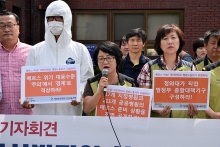PSI statement on Middle East Respiratory Syndrome (MERS) in Korea

PSI General Secretary Rosa Pavanelli called on the Korean government to take all measures necessary to protect public health and public health workers:
“Korea is not Liberia, it is not Sierra Leone, it is not Guinea. Korea has the resources to protect its people and the workers who provide frontline healthcare, but also the workers responsible for receiving travellers from overseas, for providing public transportation, and a range of other services that people depend on in their daily lives. Government’s short-sighted focus on cutting funding to the health sector is costing lives. Privatisation of healthcare services is proving to be a threat for patients, and the attempt to destroy trade unions is threatening the protection of workers.”
The Korean Health and Medical Workers’ Union and the Korean Public Service and Transport Workers’ Union are desperately attempting to focus government attention on the dangers posed by MERS. Cuts in in health and social services and their privatisation are affecting the quality of care. In fact, all of the 164 people infected – 23 of those already died - contracted the infections in healthcare facilities. Three hospitals have been at least partially shut and two have been locked down with patients and medical staff inside.
This shows that the incapacity to control the outbreak of the disease is the responsibility of the government. Workers don’t have the personal protective equipment to protect themselves and stop the spread. With nurse staffing levels significantly lower than the OECD average and a dearth of public healthcare facilities with the proper equipment, it is impossible to provide the level of care and precautionary measures required to contain the disease. Informal patient care workers and subcontracted hospital workers have been excluded from disease prevention measures and are being infected. An increase in staffing levels and providing for the direct and permanent employment for all hospital workers are necessary to stop the spread of MERS in the short-run and to strengthen the Korean healthcare system for the future.
Gail Adams, Head of Nursing at UK union UNISON supports the Korean unions:
“UNISON just hosted a PSI meeting of trade unions and specialists to focus on the issue of staff-patient ratios in healthcare. All of the evidence points to the fact that staffing levels are key to health outcomes. This is especially true with infectious diseases such as MERS or Ebola. The fewer qualified staff, the more infections and the more deaths, both within the population at large as well as amongst health workers.”
Maria Castaneda, co-chair of PSI’s global Emergencies and Disasters Working Group and Secretary-Treasurer of 1199SEIU United Healthcare Workers East in the USA cautioned:
“In New York our union demanded, and is participating in a system-wide approach to disasters, including epidemics, among all hospitals, staffed by union-management committees. The expertise and concerns of the frontline workers must be integrated into planning, both in response to the threats and to better prepare for the next inevitable crises. This is an approach applicable to all countries, regardless of level of development, and will result in a vastly more effective response to outbreaks and disasters.”

